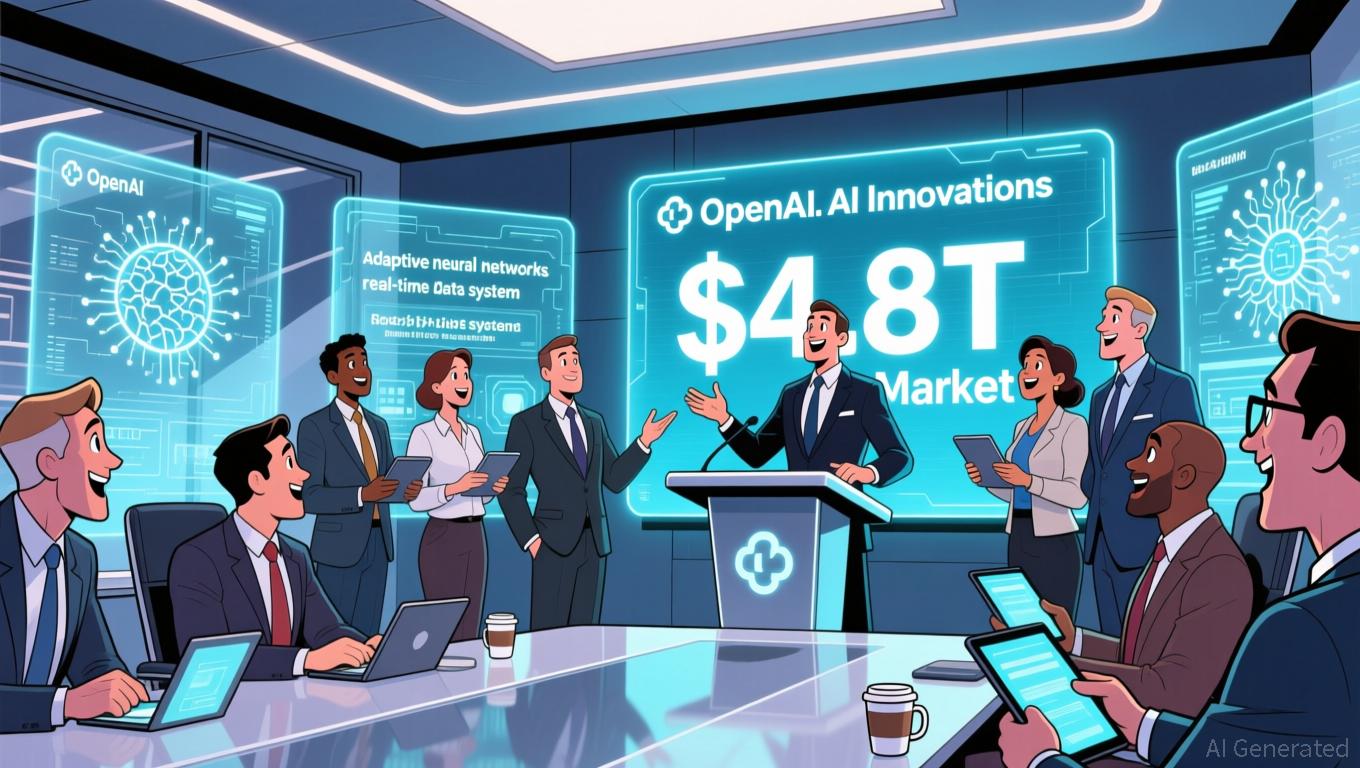Investor Excitement Rises as OpenAI's Breakthroughs in AI Aim for $4.8 Trillion Market
- OpenAI's rumored 2027 IPO sparks speculative trading, with indirect investments surging 108% as investors bet on its $4.8T AI market potential. - Product innovations like Operator AI and o1 model, plus $11.6B 2025 revenue projections, highlight OpenAI's disruptive potential in tech sectors. - Young investor Samik Sidhu's $72,700 AI-linked gains mirror broader trends, as Microsoft-NVIDIA partnerships and Stargate Project amplify expectations. - Legal risks (copyright lawsuits) and Microsoft dependency con
OpenAI’s Possible IPO Ignites Investor Excitement Amid AI Industry Surge
The artificial intelligence industry is energizing financial markets worldwide, and speculation about OpenAI’s potential IPO has intensified trading activity and investor confidence. Although OpenAI has not confirmed a specific date for going public, rumors of a 2027 listing have already led to increased indirect investments in its affiliates and a 108% theoretical price increase in speculative trades, as outlined in a

Recent product releases from OpenAI, including the Operator AI agent and the o1 model, have further fueled investor interest. Operator, now accessible to U.S. ChatGPT Pro subscribers, automates web-based tasks and is set for international expansion, while the o1 model is designed to lower software development expenses, according to the Capital.com guide. These advancements, along with a projected $11.6 billion in revenue for 2025, highlight OpenAI’s potential to shake up established tech industries. Still, there are notable risks: regulatory hurdles, such as a copyright dispute over training data, and heavy reliance on Microsoft’s Azure platform could slow momentum after the IPO.
Investor enthusiasm extends beyond major institutions. This year, 17-year-old Samik Sidhu made headlines by using profits from his e-commerce businesses to invest in AI-related stocks, earning $72,700 in less than twelve months. Sidhu’s investments included Nvidia and C3.ai, which he credited for benefiting from the AI surge. “I caught the AI wave at the perfect time,” he remarked, noting that AI tools improved his e-commerce performance, as detailed in a
The Stargate Project—a $500 billion AI infrastructure collaboration involving OpenAI, Microsoft, and major tech firms like NVIDIA—has further raised expectations. However, experts warn that excessive dependence on a few key partners could make OpenAI vulnerable to market swings. For example, IBM’s slower adoption of AI, shown by limited growth in government contracts, illustrates the difficulties of expanding AI in specialized markets, according to a
Despite these concerns, the appeal of the AI industry remains strong. OpenAI’s partnerships, especially its integration with Microsoft’s Azure, position it well to meet enterprise needs. At the same time, speculative trading through contracts for difference (CFDs) enables investors to wager on OpenAI’s future stock value without owning shares directly, the Capital.com guide explains.
As the possibility of an IPO draws nearer, investors are watching OpenAI’s legal and regulatory situation closely. The ongoing lawsuit with Elon Musk, who claims the company is prioritizing profits over safety, could affect its image. On the other hand, efforts to lead in AI governance may strengthen its standing as a responsible innovator, according to the Capital.com guide.
For now, investors are encouraged to monitor indirect opportunities through Microsoft, Nvidia, and other AI collaborators. When OpenAI eventually goes public, it could transform the technology sector—but until then, the Capital.com guide advises that patience and prudence are essential for investors.
Disclaimer: The content of this article solely reflects the author's opinion and does not represent the platform in any capacity. This article is not intended to serve as a reference for making investment decisions.
You may also like
From Space Exploration to Innovative Marketing: The UK Strengthens Its Position as a Tech Leader
- UK strengthens tech leadership through space defense, education tools, and creative campaigns, showcasing multifaceted innovation. - Raytheon UK secures contract to enhance orbital analysis via NORSSTrack software, supporting national space domain awareness and debris monitoring. - University of Kentucky launches Canva Enterprise to standardize branding, enabling staff to create professional materials with shared templates. - Apple UK invites iPad users to design Christmas projections, continuing public

Bitcoin News Update: Airdrop Frenzy and High Leverage Trigger SAPIEN's Plunge, Revealing the Vulnerable Heart of the Crypto Market
- SAPIEN and GIGGLE faced second-largest crypto liquidations after BTC/ETH, driven by volatile price swings linked to Binance's airdrop and listing speculation. - SAPIEN surged 127% on "Binance HODLer Airdrop" hype but collapsed as leveraged traders faced margin calls amid rapid one-hour $0.32 price spikes. - Analysts highlight market fragility: speculative airdrops and listing rumors trigger explosive gains but expose liquidity risks in leveraged trading environments. - GIGGLE's unclear price drivers sugg

UK and U.S. Coordinate Stablecoin Regulations to Avoid Market Fragmentation and Foster Innovation
- The Bank of England aligns stablecoin rules with U.S. standards to prevent market fragmentation and boost innovation. - Deputy Governor Sarah Breeden announced a Nov. 10 consultation paper, softening earlier strict proposals and emphasizing transatlantic collaboration. - A joint U.S.-UK task force aims to harmonize regulations, accelerating cross-border stablecoin adoption while balancing innovation and stability. - The framework will focus on transparency and consumer protections, though critics warn ra

XRP News Today: XRP's Drive Toward Institutional Adoption Challenges the Trade-off Between Practical Use and Centralized Control
- XRP ownership debates highlight community splits over 1,000-token value claims versus inflation-adjusted critiques and supply concentration risks. - XRP's $2.50 price faces bearish technical indicators, with derivatives data showing declining retail interest and potential support at $2.18. - Ripple's institutional tools (Prime, RLUSD) boost on-chain adoption but raise questions about XRP's role as a funding mechanism versus functional utility. - Analysts predict $4–$10 price potential if macro/regulatory
